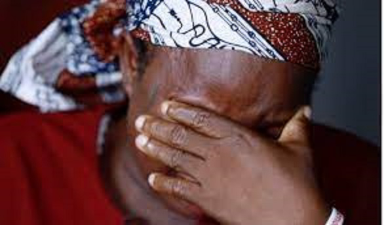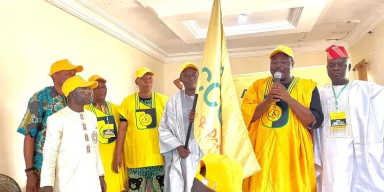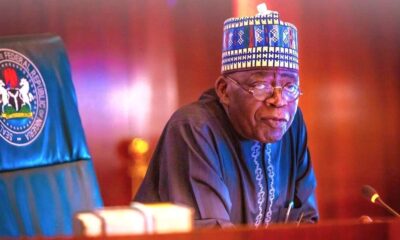News
EU Parliament president: extending border controls only possible with ‘balanced, comprehensive approach to migration’
In this interview — conducted before Germany’s decision to re-introduce border checks — EU Parliament President Roberta Metsola spoke to DW about disinformation, migration and the right-wing surge in the EU election.

Maltese conservative Roberta Metsola was reelected president of the European Parliament in July 2024, only the second person and the first woman to serve in the role for two terms
© Philipp von Ditfurth/dpa/picture alliance
DW: Right before the EU elections in June, the then European Parliament media chief Jaume Duch told me that an information war is being waged against the EU. You saw disinformation on your son’s phone. What did you feel as a mother and a politician?
Roberta Metsola: First concern, then resolve.
I was concerned. “Will this disinformation influence his choices? Had the school taught him to distinguish fact from fiction?”I thought: “If this is happening to a boy whose mother is a candidate in the elections, what influence would it have on a person who is very far away from politics?”
Then came the resolve: Fix it. Fix it with strong legislation that will enable us to act strongly, politically against those who are essentially trying to undermine the EU’s political system.
At the Campus Poland of the Future conference in Olsztyn in late August, you complained that the Member States are reluctant to implement even the best legislative answers to European problems.
Metsola: Absolutely.

Metsola says that strong legislation is needed to allow the EU to act against ‘those who are essentially trying to undermine the EU’s political system’
© Jonathan Raa/NurPhoto/picture alliance
What are the issues you are most concerned about?
Metsola: Corporate social responsibility, gender rights — we need more women in various boards — whether our laws that tackle violence against women across the EU are strong enough to protect them and, considering where I come from, migration.
You said in Olsztyn that behind every migrant story is a human being. Yet at the same time, the EU is adopting stricter migration rules — and Member States are doing the same on their own — to make the Schengen zone endure. How can a balance be found between the EU as a human rights beacon and the realpolitik of “fortress Europe?”
Metsola: It’s not an easy question. It is exactly because of our inability as the EU to find that balance that our migration policy has been failing for so long.
We have so many different national contexts — land borders, sea borders. I was speaking also from the perspective of a citizen of Malta, an island migrants are trying to reach.
I’m not a politician who would say “let’s make sure that Europe does not open its door to anyone.” I have met too many people who had no choice but to place their child on a boat, because it was safer than on land.
In the past five years we have seen the temporary reintroduction of internal border controls in many EU countries.
Metsola: The Schengen freedom of movement is sacrosanct. We fought so hard to get it. Extending internal border controls can only be done with a balanced and comprehensive approach to migration — not one that would create a silo.

Roberta Metsola comes from EU Member State Malta, an island that many migrants attempt to reach by sea
© Darrin Zammit Lupi/REUTERS
For many years we would say that the EU focuses on the countries that border it. We held summits with them, telling them we’ll invest in them on the condition that they take back their migrants. I think it will require a revolution in our international relations to develop a more coherent migration policy.
How do we find the middle road?
Metsola: I believe that the Migration Pact we adopted in March can start to work on that middle road. On the one hand, solidarity between the Member States; on the other, strong external border protection — obviously different on land and on sea, the return of those who are not eligible for protection, but not isolating our migration policy from our neighborhood and development policy.
But again, we can have the best laws on paper, but if they are not implemented, then they will never work, and citizens will feel cheated.
Don’t you feel a bit powerless as the president of the institution that actually votes on these laws? After all, it is up to national governments to implement them. Don’t you wish you had some sort of figurative baseball bat to force the leaders of the Member States to implement these laws?
Metsola: Well, I see that as a little bit of my role. I have a very good relationship with the leaders of the Member States, and I present them with the fact that we are now directly elected.
The interesting situation is that all EU prime ministers are party leaders, and during the EU election campaign, they were committing, among other things, to a better implementation of EU acquis [the legislative application all EU candidate countries need to fulfill before being considered for accession – ed.].
I will hold them to it. Whenever I go to the European Council, whenever I meet any of the leaders, either individually or with my colleagues, it is my job to do it.
In early 2024, Time magazine wrote that “Metsola wants the parliament to have the power its name implies and generate laws itself.” In the light of war, migration pressure, climate change, struggling industries and the Green Deal, do you see any chance for the European Parliament to actually carve out a bit of power for itself?
Metsola: I would say that we’ve already done it. For example, the Media Freedom Act would not have been possible without a non-legislative report from the parliament.

Roberta Metsola says the European Parliament will hold EU Commission President Ursula von der Leyen (pictured here) and her commissioners to account © Dursun Aydemir/Anadolu/picture alliance
Also, look at the power the parliament wields in terms of budgetary negotiations, for example, making sure that the money goes to Ukraine, or the framework programs for EU candidate countries, the solidarity funds, Erasmus, Horizon… Without the parliament, the amounts of EU money for these programs would never have been so visible, so effective.
Now, from a legislative perspective, where does the parliament not yet have competence? Foreign affairs.
The parliamentary hearings for commissioners-designate will begin soon. Isn’t that the first and last moment when they say and do what the EP wants, and once they’re voted in, then off they go?
Metsola: I don’t think this chamber will allow that to happen. This is the first time I’m going through this process as president of the parliament and I want all commissioners to be absolutely willing to face — and respond to — tough questions from the MEPs according to their portfolio.
We expect commitments from the Commission President and her designated commissioners, and we will hold them to account.
At the press conference with Ursula von der Leyen after the vote on her second term, you said that you saw, on the Commission’s side, the acknowledgement of a stronger parliament and the will to cooperate with it. After the last five years, are you really optimistic that the institutions will cooperate?
Metsola: If the last five years showed us anything, it is that even in areas where there once was no cooperation, there was cooperation when we had no choice. I refer specifically to the Russian invasion of Ukraine and the immediate responses that had to be taken. We saw great cooperation on the political and the legislative level.
Would I have wished for more? Absolutely. Would I have expected some commissioners to be more respectful towards the parliament? Absolutely. Will I insist that the next five years be better? Always.

Populist, far-right parties such as Alternative for Germany (AfD) polled strongly across Europe in June’s EU elections
© Jörg Carstensen/dpa/picture alliance
We now have an incumbent president of the European Commission, a number of incumbent commissioners, but also many new ones. We will hold them all to account, not only at the beginning and at the end of their terms.
We’ve seen the parliament taking other EU institutions to court when this sincere respect and cooperation wasn’t upheld. And I’m the one who signs the decisions to do it — without hesitation — because I was given the mandate to do so. I will not stop.
Two years ago you had to assist the police in an operation that uncovered the so-called “Qatargate” corruption scandal. Senior MEPs were involved. The press accused a former Latvian MEP of spying for Russia. That didn’t help the image of the parliament. Are you sure political corruption will never happen again?
Metsola: It goes without saying that I hope such things will not happen again. I understand that for many parts of the world, near and far, the European Parliament, its members and its very existence are a threat.
And as someone who has fought corruption all my life — not only in my own country but in others, too — if I have a real problem on my hands, I will not make an excuse to do nothing simply because it might happen again.
Back then, my colleagues and I immediately embarked on a quest for a series of reforms that were very difficult to pass. We looked for majorities. Some new regulations went as far as I wished them to, some didn’t.
But I am glad that the election showed that people recognized our efforts. Does that mean it will never happen again? I cannot say that. But at least we have inbuilt firewalls and alarm bells to hear the signals earlier.
The outcome of the EU elections means that for the next five years, you will be dealing with a huge representation of far-right parties. Do you think such a divided parliament will be able to pass the right legislation and then ensure its implementation in the Member States?
Metsola: I consider myself part of the constructive pro-European majority that wants to build rather than destroy. And I hope that this majority, which elected me in 2022 and reelected me in 2024, will stick together to adopt tough legislation, to hold other institutions to account, to self-reform and to be ready to adapt to challenges.
So, I look forward to a parliament where majorities are formed, rather than a divided one. Will it be harder? Yes. But I am not going to question the voters’ choice. I consider myself a president of every member of the EP, my job is to make sure decisions are made here. I am confident that we can find majorities, although the MEPs are responsible for their own actions.
This interview has been edited and condensed for length.
Edited by: Aingeal Flanagan
Author: Michal Gostkiewicz
News
AMNESTY INTERNATIONAL FLAGS IMO “TIGER BASE,” VOWS PUBLIC DISCLOSURE OF ALLEGED RIGHTS VIOLATIONS.

By Prince Uwalaka Chimaroke
14- DEC- 2025
Amnesty International has announced plans to make public, within the week, a comprehensive report detailing alleged human rights violations at the Tiger Base detention facility in Owerri, the Imo State capital. The organisation said its findings point to what it described as deep-rooted and disturbing practices that raise serious concerns about the conduct of security operations and the protection of fundamental rights.
Speaking on behalf of the organisation, the Country Director of Amnesty International in Nigeria, Isa Sanusi, stated that the group’s investigations, carried out over several months, uncovered accounts that suggest a pattern of abuse at the facility. He described the allegations as severe and warned that their implications extend beyond Imo State to Nigeria’s broader human rights reputation.
According to Sanusi, Amnesty International believes that the continued operation of facilities accused of such practices undermines public trust in the justice and security system. He stressed that the organisation is releasing its findings in the interest of transparency and public awareness, noting that citizens have a right to know how detention centres are being run.
The rights body also called on relevant authorities to respond promptly to the allegations, emphasizing the need for independent scrutiny and accountability where violations are established. Amnesty maintained that addressing such concerns decisively is essential to restoring confidence in law enforcement institutions.
Beyond the situation in Imo State, the organisation also commented on recent political developments in West Africa, including the attempted coup in the Benin Republic. Sanusi clarified that Amnesty’s position is not driven by political interests but by concern for the human rights consequences that often accompany military interventions and political instability.
He observed that military takeovers frequently result in the erosion of civil liberties and the suspension of democratic safeguards, adding that the recurring instability in the sub-region highlights the urgent need to strengthen democratic institutions and governance structures. According to him, democracy remains the most reliable framework for safeguarding human rights when it functions effectively and delivers justice to citizens.
Amnesty International further noted that it will continue to monitor developments in Benin and other parts of the region while sustaining its focus on domestic human rights issues in Nigeria. The organisation reiterated that the protection of human dignity must remain paramount, regardless of political or security challenges.
Sanusi concluded by stating that the forthcoming report on the Tiger Base facility should be seen as a call for introspection and reform, stressing that accountability within Nigeria is closely linked to the country’s standing and credibility on the international stage.
News
UK Will Pay With Blood If It Doesn’t Take Putin’s WW3 Warning Serious – Ukrainian Major Warns (Details)

A senior Ukrainian military officer has warned that Britain is dangerously unprepared for a major war and could pay a “high price” if Russian President Vladimir Putin expands the conflict in Ukraine to Europe.
Viktor Andrusiv, a major in the Ukrainian armed forces and former presidential adviser, said the UK must urgently learn from Ukraine’s experience before it is too late. His warning comes amid growing concern across NATO that Russia could escalate hostilities if diplomatic efforts fail.
Speaking against the backdrop of renewed calls by NATO Secretary General Mark Rutte for Europe to prepare for war “like our grandparents endured,” Andrusiv said the greatest danger lies in disbelief. According to him, many people in Western countries still struggle to accept that large-scale war on European soil is a real possibility.
“The biggest problem is that people don’t believe this can happen,” Andrusiv said. He noted that Ukraine faced a similar mindset before Russia’s full-scale invasion, when the idea of tank columns and missile strikes seemed unthinkable in the 21st century.
Putin has recently warned that Russia is prepared to go to war with Europe if peace talks over Ukraine collapse, raising fears of a direct confrontation with NATO. Such a scenario would automatically draw in the UK under the alliance’s collective defence commitments.
British defence chiefs have already cautioned that the country’s armed forces have been “hollowed out” after decades of reduced military spending following the Cold War. Andrusiv agreed with that assessment, arguing that the UK’s military structure and equipment are outdated.
“I am sure you are not prepared,” he said. “That doesn’t mean you would lose for sure, but if you are not prepared, you will pay a higher price.”
News
“Bandits Who Killed My Husband Threatening To Kill Me If I Dont Marry Their Leader” – Plateau Widow Cries Out For Help

A young widow in Plateau State has raised the alarm over persistent death threats allegedly issued by terrorists who killed her husband and are now pressuring her to marry one of their leaders or risk being murdered alongside her children.
The woman, who identified herself simply as Nanbam, disclosed her ordeal on Friday during an interview with the international non-governmental organisation, Equipping the Persecuted. She said her husband was among 40 residents killed during a brutal attack on Mushere community in Bokkos Local Government Area in August.
According to Nanbam, the assailants stormed the village, surrounded residents and carried out mass killings. She alleged that her husband was gruesomely murdered, claiming that his attackers mutilated his body before disposing of it in a nearby pond.
She further revealed that shortly after the attack, the same group began contacting her, insisting that their leader wanted to marry her. Nanbam said the calls started on the very day her husband was killed, allegedly made using her late husband’s phone number.
“They told me their leader wanted to marry me,” she said, adding that she rejected the proposal outright, stating she would never marry someone responsible for killing her husband and the father of her children.
Nanbam alleged that since then, the threats have intensified, with the callers warning that she and her three children would be killed if she continued to refuse the marriage and decline conversion to Islam. She said the callers frequently use different phone numbers, making it difficult to block or trace them.
In a bid to escape the threats, the widow said she relocated to her hometown in Mangu Local Government Area. Despite changing her SIM card on the advice of family members, she said the calls resumed weeks later, with the callers claiming they had tracked her location and threatening to attack not only her but also her children and extended family members.
She described her situation as desperate, noting that she is still grieving her husband while struggling to raise her children alone amid constant fear for their lives.
Nanbam also alleged that her attempt to seek help from the police yielded no meaningful response. She claimed officers told her the callers could not be traced due to the use of multiple phone numbers and allegedly asked her to provide money to support tracking efforts, a request she said she could not afford.
“I don’t know where to run to anymore,”she lamented, appealing for urgent help and protection as she fears that her life and those of her children remain in imminent danger.
-
Business1 year ago
US court acquits Air Peace boss, slams Mayfield $4000 fine
-

 Trending1 year ago
Trending1 year agoNYA demands release of ‘abducted’ Imo chairman, preaches good governance
-

 Politics1 year ago
Politics1 year agoMexico’s new president causes concern just weeks before the US elections
-

 Politics1 year ago
Politics1 year agoPutin invites 20 world leaders
-

 Politics1 year ago
Politics1 year agoRussia bans imports of agro-products from Kazakhstan after refusal to join BRICS
-
Entertainment1 year ago
Bobrisky falls ill in police custody, rushed to hospital
-
Entertainment1 year ago
Bobrisky transferred from Immigration to FCID, spends night behind bars
-
Education1 year ago
GOVERNOR FUBARA APPOINTS COUNCIL MEMBERS FOR KEN SARO-WIWA POLYTECHNIC BORI













